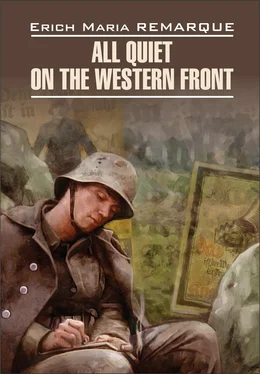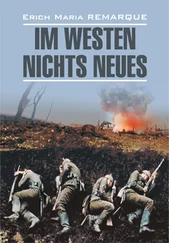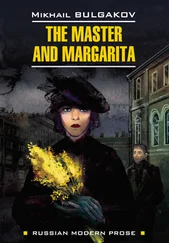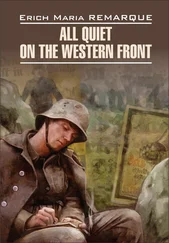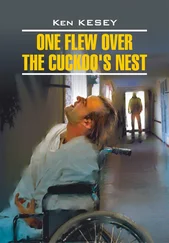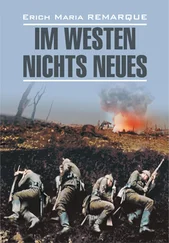She shrugs. ‘She’s already been in bed for a couple of months now, but we weren’t to write and tell you. She’s seen a few doctors. One of them told us that it’s probably cancer.’
I go along to district HQ [193] district HQ = district Headquarters – окружное военное управление
to report. I wander slowly through the streets. Occasionally people stop and have a word with me. I don’t stay for long, because I don’t feel like talking too much.
When I come out of the barracks a loud voice shouts at me. Still lost in thought I turn round and find myself free to face with a major. He bawls me out: ‘Forgotten how to salute?’
‘I’m sorry, Major,’ I say, still confused, ‘I didn’t see you.’
His voice gets even louder. ‘Can’t you even address an officer properly?’
What I’d really like to do is hit him in the face, but I control myself or else my leave will be done for, put my heels together and say, ‘My apologies, sir, I am afraid I did not see you, sir.’
‘Then be so good as to keep your eyes open,’ he snaps. ‘What’s your name?’
I tell him.
His fat red face still has outrage written all over it. ‘Regiment?’
I respond in the prescribed military manner. He still isn’t satisfied. ‘Where are you stationed?’
But now I’ve had enough, and say, ‘Somewhere between Langemarck [194] Langemarck – Лангемарк (деревня в бельгийской провинции Западная Фландрия)
and Bixschoote [195] Bixschoote – Биксскоте (деревня в бельгийской провинции Западная Фландрия)
.’
‘What do you mean?’ he asks, bewildered.
I explain to him that I have just arrived on leave an hour ago, and I imagine that now he will push off, but I am mistaken. He gets even angrier. ‘I suppose you think that’s acceptable, bringing your front-line manners back here! Never! Good discipline is still the order of the day here, thank God!’
Then he gives me the order: ‘Twenty paces back, at the double!’ [196] Twenty paces back, at the double! – Двадцать шагов назад, шагом марш!
A dull rage is seething inside me. But I can’t do anything against him – he could have me arrested on the spot if he wanted. So I double back, march forward and half a dozen yards from him I give him a parade-ground salute, and don’t take my hand away until I am another six yards past him.
He calls me back and informs me generously that on this occasion he has decided to temper justice with mercy. Still standing at attention, I indicate gratitude. ‘Dismiss,’ he orders. I do a smart about face and leave.
This spoils the evening for me. I get off home and throw my uniform into a corner – I was going to do that anyway. Then I get my civilian suit [197] civilian suit – штатский костюм
out of the wardrobe and put it on.
I’ve got out of the habit of wearing it. The suit is a bit short and a bit tight – I’ve put on some weight in the army. I have trouble fixing the collar and tying the tie. In the end my sister knots it for me. And how lightweight this suit feels. You think you are only wearing your shirt and underpants.
I look at myself in the mirror. It’s a strange sight. Looking back in bewilderment at me is a tanned and overgrown sixteen-year-old on his way to church for his confirmation.
My mother is pleased that I am wearing civvies; it makes me look more like my old self to her. My father would have preferred me to wear my uniform, though, because he would like to take me to see his friends dressed like that.
But I refuse.
It is good to be able to sit somewhere quietly, as we can in the garden of the inn opposite, under the chestnut trees, next to the skittle alley [198] skittle alley – кегельбан
. The leaves are falling, on to the table and on to the ground, but only a few, the first. I’ve a glass of beer in front of me – we learned to drink in the army. The glass is half empty, so that I have a few good, cool pulls yet, and besides, I can order a second or a third if I like. There’s no roll call and no heavy fire, the owner’s children are playing in the skittle alley and the dog comes and rests its head on my lap. The sky is blue and the green spire of St Margaret’s church rises up between the leaves of the chestnut trees.
All this is good, and I love it. But I can’t get on with the people. The only one who doesn’t ask me questions is my mother. With my father it is different. He’d like me to tell him a bit about what it is like out there: what he wants is both touching and silly, and I have no real relationship with him any more. What he would really like best is a constant flow of stories. I can see that he has no idea that these things can’t be put into words, although I’d like to do something to please him. But it would be dangerous for me to try and put it all into words, and I’m worried that it might get out of hand and I couldn’t control it any more. Where would we be if everybody knew exactly what was going on out there at the front?
And so I limit myself to telling him a few funny bits. Then he asks me whether I’ve ever been in hand-to-hand fighting. I say that I haven’t, and get up to leave.
That doesn’t help matters, though. In the street, after I’ve had a couple of shocks because the screeching of the trams sounds like a shell coming towards me, someone taps me on the shoulder. It is my German master [199] German master – учитель немецкого языка
, who lets fire with all the usual questions: ‘Now, what’s it like out there? Rough, I’ll be bound, rough? Yes, it’s terrible, but we have to stand firm. And after all, at least you’re all fed well out there, I hear. You look good, Paul, fit. Naturally, things are worse here, of course they are, goes without saying, our soldiers always come first.’
He drags me off to his local bar. I am greeted with great enthusiasm and one of the assistant headmasters shakes my hand and says, ‘Well, you’re just back from the front? How’s morale out there? Pretty good, pretty good, eh?’ I explain that everyone would like to come home. He gives a great roar of laughter. ‘I bet they do! But first of all you’ve got to wallop those Froggies [200] Froggies (сленг) – «лягушатники», прозвище французов
. Do you smoke? Here, have one of these, my dear fellow. Waiter, a beer for our young warrior.’
Unfortunately I have accepted the cigar, so I have to stay. Every one of them oozes goodwill, and there’s nothing to be done. All the same I’m irritated, and puff away as fast as I can. Just for something to do I toss down a glass of beer in one gulp. Another is ordered for me immediately; everyone knows what they owe to the soldiers. They are arguing about what we ought to annex. The assistant headmaster, who has sacrificed his gold watch-chain to the war effort and is wearing an iron one, wants the most: all of Belgium, the French coalfields and great tracts of Russia. He gives very precise reasons why we need them, and insists on his point of view until the others eventually give way and agree with him. And then he starts to explain where the breakthrough has to be made in France; in the middle of it he turns to me and says, ‘You lads out there should hurry up a bit with your eternal trench fighting. Just chuck ’em [201] ’em (разг.) – сокр. от “them”
out, and the war will be over.’
I tell him that the soldiers think a breakthrough is impossible. The other side simply has too much in the way of reserves. Besides, the war is really not like people imagine it.
Читать дальше
Конец ознакомительного отрывка
Купить книгу
